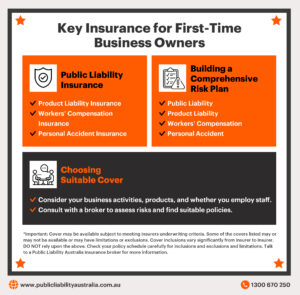Starting a new business is an exciting journey, but it’s also one that comes with responsibilities and risks. As a first-time business owner, you might be focusing on building your client base, refining your services, or perfecting your product. However, one area that shouldn’t be overlooked is securing suitable insurance to protect your business. Understanding the key types of business insurance and their role in risk management may help you safeguard your venture from unexpected challenges.
Here, we’ll explore four essential types of business insurance for new business owners, including sole traders: public liability insurance, product liability insurance, workers’ compensation insurance, and personal accident insurance.
 Public Liability Insurance: Protecting Against Third-Party Risks *
Public Liability Insurance: Protecting Against Third-Party Risks *
One of the most common and essential insurance policies for any business is public liability insurance. This cover is designed to protect your business against claims made by third parties for injuries or property damage that occur as a result of your business operations.
Why Public Liability Insurance is Important *
Public liability insurance is particularly important for businesses that interact with customers or clients on a regular basis. For example, if you run a retail store, operate a trade service, or even hold meetings with clients in an office, there is always the possibility of an accident. Whether it’s a customer slipping on a wet floor or you accidentally damaging a client’s property, public liability insurance may help cover the legal fees, medical expenses, or damages payments associated with such incidents.
Product Liability Insurance: Safeguarding Against Product-Related Risks *
If your business involves selling products, product liability insurance should be a key consideration. This insurance is designed to cover the costs associated with claims of injury or property damage caused by the products you sell or manufacture. In Australia, product liability insurance is typically bundled into the same policy as public liability insurance.
The Role of Product Liability Insurance *
Even if you take every precaution to ensure your products are safe, there’s always the potential for faults or defects. If a product you’ve sold causes harm or damage, you may be held liable for the resulting expenses. For instance, if you sell an electrical appliance that malfunctions and causes a fire, product liability insurance may cover the costs arising from injury to the user or damage to the property.
Workers’ Compensation Insurance: Covering Your Employees *
For businesses that employ staff, workers’ compensation insurance is a legal requirement in Australia. This insurance provides financial support to employees who suffer injuries or illnesses related to their work, covering medical expenses and lost wages during their recovery period.
Why Workers’ Compensation Insurance is Essential *
Employers have a duty of care to ensure the safety of their employees. Despite taking steps to create a safe work environment, accidents can still happen. Workers’ compensation insurance not only ensures that injured employees receive adequate support but also protects your business from potential legal claims. Without this cover, you could face substantial financial liability for employee injuries, as well as penalties for non-compliance with Australian laws.
Personal Accident Insurance: Protecting Sole Traders and Business Owners *
If you’re a sole trader or a business owner without employees, you may not be eligible for traditional workers’ compensation insurance. This is where personal accident insurance comes in. Personal accident insurance is designed to provide financial support if you suffer an injury or illness that prevents you from working for an extended period.
The Role of Personal Accident Insurance *
Personal accident insurance may help cover most of your lost income, medical expenses, and rehabilitation costs during recovery. For example, if you’re a sole trader operating a trade service and you sustain an injury that prevents you from working for an extended period , this insurance could provide benefits in the form of weekly payments or lump sums, depending on the policy and type of cover selected.
This type of cover is particularly valuable for sole traders who rely solely on their business income to support their lifestyle and family. By including personal accident insurance in your risk management plan, you can ensure financial stability even in the face of unexpected injuries or illnesses.
Building a Comprehensive Risk Management Plan *
Understanding the role of each type of insurance in your overall risk management plan is essential for protecting your business. Here’s how these types of insurance work together to create a safety net:
- Public Liability Insurance helps protect your business against claims from third parties for injuries or property damage.
- Product Liability Insurance safeguards your business against claims arising from product defects or malfunctions.
- Workers’ Compensation Insurance ensures that your employees are protected and that your business remains compliant with legal obligations.
- Personal Accident Insurance provides financial support if you, as a sole trader, suffer an injury or illness that affects your ability to work.
These insurance types each address different risks, allowing you to comprehensively manage potential liabilities that could otherwise have a significant financial impact on your business.
Choosing Suitable Insurance for Your Business *
When selecting the appropriate insurance for your business, it’s essential to consider the nature of your operations, the types of products or services you provide, and whether you employ staff. Keep in mind that every business is unique, and insurance needs may vary based on your specific circumstances.
To make the process easier, you may want to consult with a business insurance broker. An experienced broker can help you assess your risks, identify the insurance cover that fits your needs, and find suitable policies from reputable insurers. They may also assist you in understanding the terms and conditions of each policy, ensuring you have a suitable level of cover.
Conclusion *
As a first-time business owner, navigating insurance options may seem daunting, but understanding the basics of public liability, product liability, workers’ compensation, and personal accident insurance is a great place to start. Each of these covers plays a distinct role in protecting your business from common risks and liabilities, helping you focus on building and growing your venture with confidence.
If you’re unsure about which insurance policies are suited to your business, seeking advice from a knowledgeable insurance broker could be a wise step. A broker can guide you through the complexities of insurance and help you make informed decisions to protect your business and its future.
Disclaimer: The content of this article is intended for general informational purposes only and should not be considered as professional advice. While we strive to ensure accuracy, we make no guarantees about the completeness or reliability of the information. For guidance regarding what and how much business insurance cover you need, we recommend consulting with a business insurance broker. Any actions you take based on any information provided here are at your own discretion.





